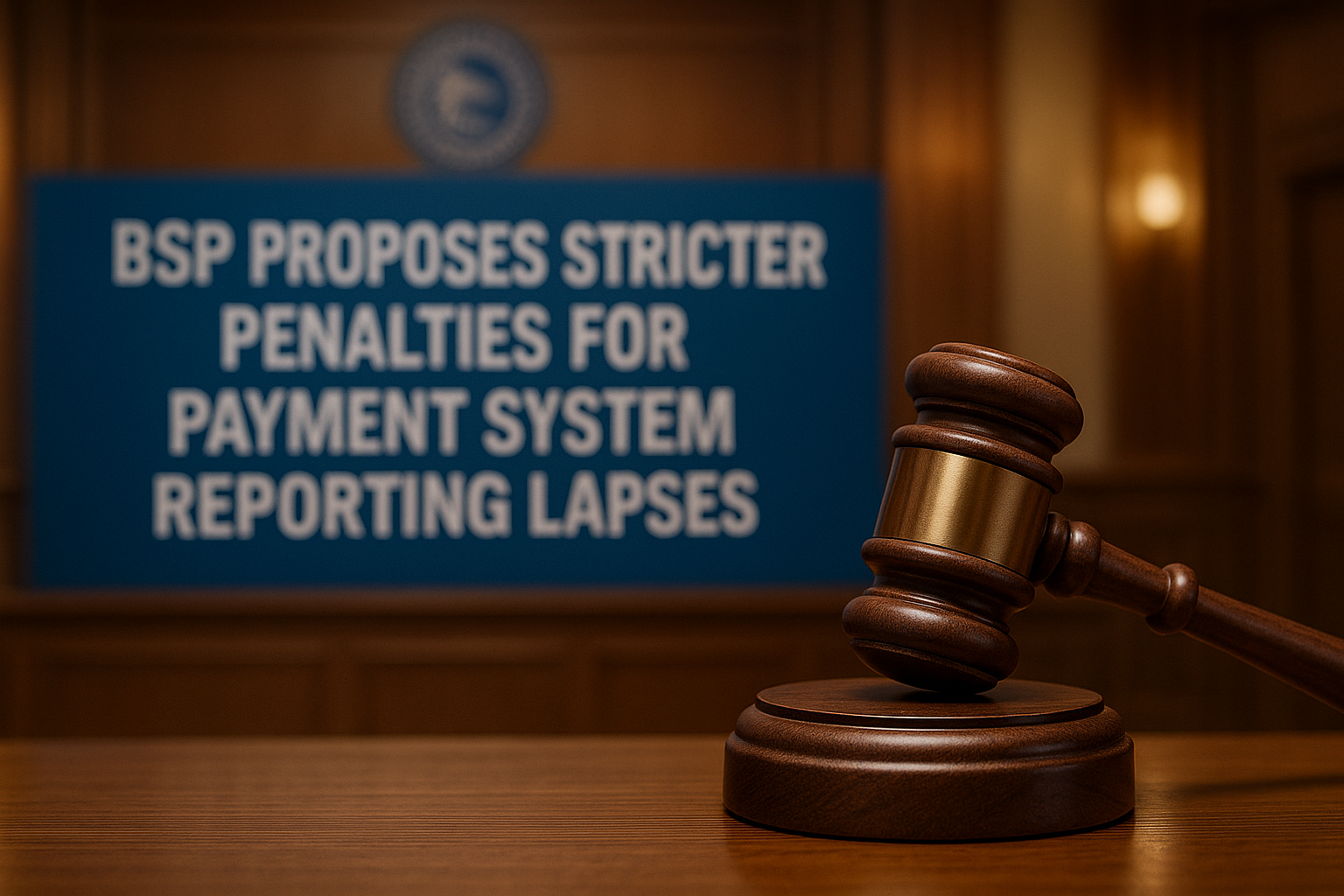BSP Proposes Tougher Penalties for Reporting Lapses: What Payment Operators Need to Know
.svg)
The payments landscape in the Philippines has transformed rapidly in recent years. Digital payments now account for more than half of all retail transactions in the country, and uptake continues to grow as consumers and businesses turn to mobile wallets, online transfers, QR payments, and instant fund movements.
This shift has also brought new expectations from regulators. As digital transactions scale, the integrity of data, the accuracy of reporting, and the ability of payment system operators to maintain strong compliance controls have become non negotiable. The Bangko Sentral ng Pilipinas (BSP) has repeatedly emphasised that a safe and reliable digital payments ecosystem requires timely and accurate regulatory submissions.
This is the backdrop of the BSP’s newly proposed penalty framework for reporting lapses among payment system operators. It is a significant development. The proposal introduces daily monetary penalties for inaccurate or late submissions, along with potential non monetary sanctions for responsible officers. While the circular is still open for industry comments, its message is clear. Reporting lapses are no longer administrative oversights. They are operational weaknesses that can create systemic risk.
This blog unpacks what the proposal means, why it matters, and how financial institutions can strengthen their compliance and reporting environment in preparation for a more stringent regulatory era.

Why BSP Is Tightening Its Penalty Framework
The Philippines payments environment has seen rapid adoption of digital technologies, driven by financial inclusion goals and customer expectations for speed and convenience. With this acceleration comes a larger volume of data that financial institutions must capture, analyse, and report to regulators.
Several factors explain why BSP is moving towards stricter penalties:
1. Reporting is foundational to systemic stability
Regulators rely on accurate data to assess risks in the payment system. Gaps, inaccuracies, or delays can compromise oversight and create blind spots in areas such as liquidity flows, settlement patterns, operational disruptions, fraud, and unusual transaction activity.
2. Growth of non bank players
Many payment functions are now driven by fintechs, payment service providers, and other non bank operators. While this innovation expands access, it also requires a higher level of supervisory vigilance.
3. Increasing use of instant payments
With real real time payment channels becoming mainstream, reporting integrity becomes more critical. A single faulty dataset can affect risk assessments across multiple institutions.
4. Rise in financial crime and operational risk
Fraud, mule activity, phishing, account takeovers, and cross border scams have all increased. Accurate reporting helps regulators track patterns and intervene quickly.
5. Alignment with data governance expectations globally
Across ASEAN and beyond, regulators are raising standards for data quality, governance, and reporting. BSP’s proposal follows this global trend.
In short, accurate reporting is no longer just compliance housekeeping. It is central to maintaining trust and stability in a digital financial system.
What the BSP’s Proposed Penalty Framework Includes
The draft circular introduces several new enforcement mechanisms that significantly raise the stakes for reporting lapses.
1. Daily monetary penalties
Instead of one time fines, penalties may accrue daily until the issue is corrected. The amounts vary by institution type:
- Large banks: up to PHP 3,000 per day
- Digital banks: up to PHP 2,000 per day
- Thrift banks: up to PHP 1,500 per day
- Rural and cooperative banks: PHP 450 per day
- Non bank payment system operators: up to PHP 1,000 per day
These penalties apply after the first resubmission window. If the revised report still fails to meet BSP’s standards, the daily penalty starts accumulating.
2. Potential non monetary sanctions
Beyond fines, responsible directors or officers may face:
- Suspension
- Disqualification
- Other administrative measures
This signals that reporting lapses are now viewed as governance failures, not just operational issues.
3. Covers accuracy, completeness, and timeliness
Reporting lapses include:
- Late submissions
- Incorrect data
- Missing fields
- Inconsistent formatting
- Incomplete reports
BSP is emphasising the importance of end to end data integrity.
4. Applies to all payment system operators
This includes banks and non bank entities engaged in:
- E wallets
- Remittance services
- Payment gateways
- Digital payment rails
- Card networks
- Clearing and settlement participants
The message is clear. Every participant in the payments ecosystem has a responsibility to ensure accurate reporting.
Why Reporting Lapses Are Becoming a Serious Compliance Risk
Reporting lapses may seem minor compared to fraud, AML breaches, or cybersecurity threats. However, in a digital financial system, they can trigger serious operational and reputational consequences.
1. Reporting inaccuracies can mask suspicious patterns
Poor quality data can hide indicators of financial crime, mule activity, unusual flows, or cross channel fraud.
2. Delays affect systemic risk monitoring
In real time payments, regulators need timely data to detect anomalies and protect end users.
3. Data discrepancies create regulatory red flags
Repeated corrections or inconsistencies may suggest weak controls, insufficient oversight, or internal process failures.
4. Poor reporting signals weak operational governance
BSP views reporting as a reflection of an institution’s internal controls, risk management capability, and overall compliance culture.
5. Reputational risk for institutions
Long term credibility with regulators is tied to consistent compliance performance.
In environments like the Philippines, where digital adoption is growing quickly, institutions that fall behind on reporting standards face increasing supervisory pressure.

How Payment Operators Can Strengthen Their Reporting Framework
To operate confidently in this environment, organisations need strong internal processes, data governance frameworks, and technology that supports accurate, timely reporting.
Here are key steps financial institutions can take.
1. Strengthen internal governance for reporting
Institutions should formalise clear roles and ownership for reporting accuracy, including:
- Defined reporting workflows
- Documented data lineage
- Internal sign offs before submission
- Review and escalation protocols
- Consistent internal audit coverage
Treating reporting as a governance function rather than a technical task helps reduce errors.
2. Improve data quality controls
Reporting issues often stem from weak data foundations. Institutions should invest in:
- Data validation at source
- Automated quality checks
- Consistency rules across systems
- Deduplication and formatting controls
- Stronger reconciliation processes
Accurate reporting starts with clean, validated data.
3. Reduce manual dependencies
Manual processing increases the risk of:
- Typos
- Formatting errors
- Wrong values
- Missing fields
- Late submissions
Automation can significantly improve accuracy and speed.
4. Establish real time monitoring for data readiness
Real time payments require real time visibility. Institutions should build dashboards that track:
- Submission deadlines
- Pending validations
- Data anomalies
- Report generation status
- Submission completeness
Proactive monitoring helps prevent last minute errors.
5. Build a reporting culture
Compliance culture is not limited to the AML or risk team. Reporting accuracy must be part of the organisation’s broader mindset.
This includes:
- Leadership awareness
- Cross functional coordination
- Regular staff training
- Internal awareness of BSP standards
A strong culture reduces repeat errors and supports sustainable compliance.
Where Technology Plays a Transformative Role
Payment operators in the Philippines face growing expectations from regulators, customers, and partners. Manual systems will struggle to keep pace with the increasing volume, speed, and complexity of payments and reporting requirements.
Advanced compliance technology offers significant advantages in this environment.
1. Automated data validation and enrichment
Technology can continuously clean, check, and normalise data, reducing errors at source.
2. Stronger reporting accuracy with AI powered checks
Modern systems detect anomalies and provide real time alerts before submission.
3. Integrated risk and reporting environment
Unified platforms reduce fragmentation, helping ensure data consistency across AML, payments, and reporting functions.
4. Faster submission cycles
Automated generation and submission reduce operational delays.
5. Lower compliance cost per transaction
Technology reduces manual dependency and improves investigator productivity.
This is where Tookitaki’s approach provides strong value to institutions in the Philippines.
How Tookitaki Helps Strengthen Reporting and Compliance in the Philippines
Tookitaki supports financial institutions through a combination of its Trust Layer, federated intelligence, and advanced compliance platform, FinCense. These capabilities help institutions reduce reporting lapses and elevate overall governance.
Importantly, several leading digital financial institutions in the Philippines already work with Tookitaki to strengthen their AML and compliance foundations. Customers like Maya and PayMongo use Tookitaki solutions to build cleaner data pipelines, enhance risk analysis, and maintain strong reporting resilience in a rapidly evolving regulatory environment.
1. FinCense improves data integrity and monitoring
FinCense provides automated data checks, risk analysis, and validation across AML, fraud, and compliance domains. This ensures that institutions operate with cleaner and more accurate datasets, which flow directly into reporting.
2. Agentic AI enhances investigation quality
Tookitaki’s AI powered investigation tools help identify inconsistencies, suspicious patterns, or data gaps early. This reduces the risk of incorrect reporting and strengthens audit readiness.
3. Better governance through the Trust Layer
Tookitaki’s Trust Layer enables consistency, transparency, and explainability across decisions and reporting. Institutions gain a clear record of how data is processed, how decisions are made, and how controls are applied.
4. Federated intelligence helps identify systemic risks
Through the AFC Ecosystem, member institutions benefit from shared insights on emerging typologies, reporting vulnerabilities, and financial crime risks. This community driven model enhances awareness and strengthens reporting standards.
5. Configurable reporting and audit tools
FinCense supports financial institutions with structured reporting exports, audit logs, and compliance dashboards that help generate accurate and complete reports aligned with regulatory expectations.
For organisations preparing for a tighter penalty regime, these capabilities help elevate reporting from reactive to proactive.
What This Regulatory Shift Means for the Future
The BSP’s proposed penalties are part of a larger trend shaping financial regulation:
1. Data governance is becoming a compliance priority
Institutions will need full visibility into where data comes from, how it is transformed, and who is responsible for each reporting field.
2. Expect more scrutiny on non banks
Fintechs and payment providers will face higher regulatory expectations as their role in the ecosystem grows.
3. Technology adoption will accelerate
Manual reporting processes will not scale. Institutions will need automation and advanced analytics to meet higher standards.
4. Reporting accuracy will influence regulatory trust
Organisations that demonstrate consistent accuracy will gain smoother interactions, fewer supervisory interventions, and more regulatory confidence.
5. Strong compliance will help drive competitive advantage
In the digital payments era, trust is a business asset. Institutions that demonstrate reliability and transparency will attract more customers and partners.
Conclusion
The BSP’s proposed penalty framework is more than a compliance update. It is a signal that the Philippines is strengthening its digital payments ecosystem and aligning financial regulation with global standards.
For payment system operators, the message is clear. Reporting lapses must be addressed through better governance, stronger data quality, and robust technology. Institutions that invest early will be better positioned to operate with confidence, reduce regulatory risk, and build long term trust with stakeholders.
Tookitaki remains committed to supporting financial institutions in the Philippines with advanced, trusted, and future ready compliance technology that strengthens reporting, reduces operational risk, and enhances governance across the payments ecosystem.
Experience the most intelligent AML and fraud prevention platform
Experience the most intelligent AML and fraud prevention platform
Experience the most intelligent AML and fraud prevention platform
Top AML Scenarios in ASEAN

The Role of AML Software in Compliance








